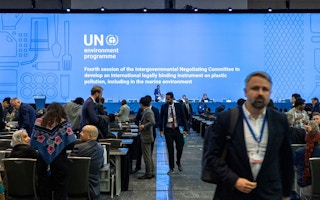Plastic pollution poses a threat to ecosystems worldwide, choking our oceans and littering our landscapes. If we don’t act now, plastics entering our oceans could triple in 2040. The attempts to reduce plastic waste so far, which have relied on voluntary measures, have proven to be unsuccessful. Tighter regulations are necessary to encourage collective action in eliminating plastic waste and pollution.
The good news? The UN Environment Assembly (UNEA) took a significant step forward in 2022 by passing the mandate for developing a legally binding international agreement to tackle plastic pollution. This prospective treaty has the potential to revolutionise the plastics lifecycle, from production to disposal, and create a level playing field in the global economy.
Our planet is at a critical moment, grappling with a complex environmental crisis known as the “triple planetary crisis”. This crisis intertwines three major threats: pollution, climate change, and biodiversity loss. These interconnected issues pose a significant challenge to the health of our planet and the well-being of all living things.
A prime example of this worrying synergy is plastic pollution. The sheer volume of plastic entering our environment each year – a staggering 19-23 million tonnes – paints a grim picture. Since the 1950s, an estimated 8.3 billion metric tonnes of plastic have been produced, with a shocking 6.3 billion tonnes already discarded.
This plastic, due to its strong chemical structure, does not biodegrade in nature. It photodegrades slowly, leaving behind toxins that accumulate for centuries, harming marine and wildlife, contaminating our soil and groundwater, and biomagnifies as it goes from one level to the next in the food chain including human bodies.
“
Efforts to minimise microplastic release and improve landfill management practices … are essential components of comprehensive strategies to tackle both plastic pollution and climate change.
And it’s not just the visible litter that poses a threat: the greenhouse gasses emitted throughout the life cycle of plastics contribute significantly to global warming. Recent scientific research highlights that plastics account for 3.8-4.5 per cent of global greenhouse gas emissions, with plastic production alone contributing a staggering 85 per cent. Moreover, 90 per cent of all plastics are derived from fossil fuels which directly contributes to the global carbon budget.
Plastic pollution disrupts ecosystems at every level. Marine animals often mistake plastic debris for food, leading to entanglement, starvation, and death. A 2015 study estimated that up to 5.25 trillion plastic particles are currently afloat at sea, posing a significant threat to marine life.
Microplastics, tiny fragments less than 5 millimeters in size, are particularly concerning. They can be consumed by various organisms, spanning from plankton to humans, and may accumulate in the food chain, presenting unknown long-term repercussions.
Microplastics have been detected in numerous everyday items, including bottled water and table salt, prompting worries about their potential impact on human health. Although research is ongoing, some studies indicate that microplastics might interfere with hormones, harm organs, and potentially exacerbate certain health issues.
Effective cooperation among multilateral environmental agreements is paramount in tackling the complex and interrelated challenges that comprise the triple planetary crisis.
Therefore, negotiations for a global plastics instrument thus present a golden opportunity. It has the potential to strengthen global cooperation and provide a framework for concerted action to tackle both plastic pollution and its climate impacts.
This instrument, through fostering international collaboration, can address both concerns simultaneously. It can maximise benefits by mandating controls on overall production, hazardous chemicals and polymers across the entire plastic lifecycle, particularly within the context of climate change.
In light of compelling scientific evidence and the growing global commitment to combat climate change, it is imperative that the proposed instrument for addressing plastic pollution acknowledges several crucial points.
A report by the Organisation for Economic Co-operation and Development (OECD) highlights that plastics contribute to a significant portion of global greenhouse gas (GHG) emissions – around 3.4 per cent in 2019. This percentage is projected to more than double by 2060 if we don’t take action. To address this challenge, nations must recognise the inherent link between greenhouse gas emissions and plastic pollution.
By doing so, they can undertake concrete actions to reduce emissions throughout the entire plastic lifecycle. This involves strategies such as decreasing the production of primary polymers, promoting the use of non-plastic alternatives with lower carbon footprints which are in alignment with local Indigenous solutions and safety criteria dictated by an independent science-based body, and transitioning towards reuse and refill systems while phasing out problematic plastics.
In addition, the instrument should highlight the importance of considering climate impacts when designing plastic products. Emphasising the use of low-carbon polymers and materials with minimal energy requirements during production can help minimise emissions.
A study published in ChemRxiv demonstrates that selecting materials based on their environmental persistence during the design phase can lead to substantial societal benefits. Efforts to minimise the release of microplastics into the environment are also crucial for preserving ecosystems and mitigating climate impacts.
Furthermore, urgent action is needed to address plastic pollution and its climate change implications through proactive environmental measures and landfill management. Enhancing trade regulations to incorporate the assessment of greenhouse gas emissions is a vital step in this direction.
Additionally, efforts to minimise microplastic release and improve landfill management practices, such as implementing composting and material recovery initiatives, are essential components of comprehensive strategies to tackle both plastic pollution and climate change.
By acknowledging these interconnected issues and implementing targeted measures, we can work towards a more sustainable and resilient future, mitigating the adverse impacts of plastic pollution while contributing to global climate change mitigation efforts.
Plastic pollution is a complex problem, but it’s clear we need to act now. The evidence from scientists is undeniable, showing the serious damage it’s causing to the environment, our health, and our economies. A binding agreement on stopping plastic pollution is a pragmatic necessity for safeguarding our planet and securing a better future for generations to come.
It represents a bold commitment to life on Earth, recognising that the time for half-measures and voluntary pledges is over. Now is the time for decisive action, political will, and international cooperation to turn the tide on plastic pollution and build a more sustainable world for all.
Dr. Shahriar Hossain holds a Ph.D. in Urban Ecology, while currently serving as visiting faculty at Georgetown University. His advocacy work focuses on biodiversity, wildlife protection, and Plastic pollution and toxic waste management, promoting eco-friendly alternatives









